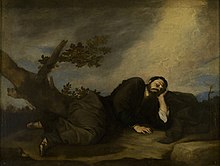Bethel

Bethel Ugaritic: bt il, meaning "House of El" or "House of God",[1] Template:Lang-he-n, also transliterated Beth El, Beth-El, or Beit El; Greek: Βαιθηλ; Latin: Bethel) was a border city described in the Hebrew Bible as being located between Benjamin and Ephraim and also a location named by Jacob. Edward Robinson identified the village of Beitin in the West Bank with ancient Bethel in Biblical Researches in Palestine, 1838–52. He based this assessment on its fitting the location described in earlier texts, and on the philological similarities between the modern and ancient name, arguing that the replacement of the Hebrew el with the Arabic in was not unusual. During Israelite rule, Bethel first belonged to the Tribe of Benjamin, but was later conquered by the Tribe of Ephraim. Eusebius of Caesarea and Jerome describe it in their time as a small village that lay 12 Roman miles north of Jerusalem, to the right or east of the road leading to Neapolis.[2]
Ten years after the Six Day War, the biblical name was applied to an Israeli settlement Beit El constructed adjacent to Beitin. In several countries - particularly in the US - the name was given to various locations (see Bethel (disambiguation)).
A second biblical Bethel, in the southern Judah, is mentioned in the Book of Joshua (Joshua 8:17 and Joshua 12:16), and seems to be the same as Bethul or Bethuel, a city of the tribe of Simeon.
History

Bethel is mentioned several times in Genesis. It is first mentioned in Genesis 12,[3] but the best-known instance is probably Genesis 28,[4] when Jacob, fleeing from the wrath of his brother Esau, falls asleep on a stone and dreams of a ladder stretching between Heaven and Earth and thronged with angels; God stands at the top of the ladder, and promises Jacob the land of Canaan; when Jacob awakes he anoints the stone (baetylus) with oil and names the place Bethel. Another account, from Genesis 35[5] repeats the covenant with God and the naming of the place (as El-Bethel), and makes this the site of Jacob's own change of name to Israel. Both versions state that the original name of the place was Luz, a Canaanite name.
Bethel was an important religious center for the northern Kingdom of Israel following the break-up of the united kingdom of David and Solomon. The Second Book of Kings describes how Jeroboam, first king of Israel, set up centers for Golden Calf worshippers at Bethel on the southern boundary of his kingdom and Dan on the northern boundary, and appointed non-Levites as his priests (1 Kings 12:25–33). Jeroboam's decision to pass over the Mushite priests of Shiloh, the original religious center for Israel, deeply offended the Shiloh priesthood and seems to lie behind much of the animosity directed at Jeroboam and the golden calf, which probably emanated from the Mushite priestly clan.
Bethel escaped destruction during the Assyrian conquest of Israel (721 BC), but was occupied by King Josiah of Judah (c.640–609 BC), who, according to the book of Kings, destroyed the ancient Israelite religious center.[6]
Bethel was again inhabited and "fortified by Bacchides the Syrian in the time of the Maccabees."[2] Josephus tells us that Bethel was captured by Vespasian. Robinson notes that after the writings of Eusebius and Jerome, he found no further references to Bethel in the written historical record. However, he notes that the ruins at Beitin are greater than those of a village and seem to have undergone expansion after the time of Jerome, noting also the presence of what appear to be ruins of churches from the Middle Ages.[2]
Bethel is also mentioned in the Book of Amos:
But do not seek Bethel, Nor enter Gilgal, Nor pass over to Beersheba; For Gilgal shall surely go into captivity, And Bethel shall come to nothing.
— Amos 5:5, New King James Version
Don't prophesy anymore at Bethel, because this is the king's sanctuary and the temple of the kingdom.
— Amos 7:13, New International Version
31°56′31.2″N 35°13′19.2″E / 31.942000°N 35.222000°E
References
- ^ Bleeker and Widegren, 1988, p. 257.
- ^ a b c Robinson and Smith, 1856, pp. 449–450.
- ^ Genesis 12 / בראשית י"ב (Origin), Genesis 12:8 (Translation)
- ^ Genesis 28 / בראשית כ"ח (Origin), Genesis 28:19 (Translation)
- ^ Genesis 35 / בראשית ל"ה (Origin), Genesis 35:7 (Translation)
- ^ "Bethel". Encyclopædia Britannica from Encyclopædia Britannica 2007 Ultimate Reference Suite (2007).
Bibliography
- Gomes, Jules Francis (2006), The Sanctuary of Bethel and the Configuration of Israelite Identity, Walter de Gruyter & Co, ISBN 978-3-11-018993-3
- Bleeker, C. J.; Widengren, G. (1988), Historia Religionum: Handbook for the History of Religions, BRILL, ISBN 978-90-04-08928-0
- Robinson, Edward; Smith, Eli (1856), Biblical Researches in Palestine, 1838–52: A Journal of Travels in the Year 1838, University of Michigan
- Encyclopædia Britannica 2007 Ultimate Reference Suite
